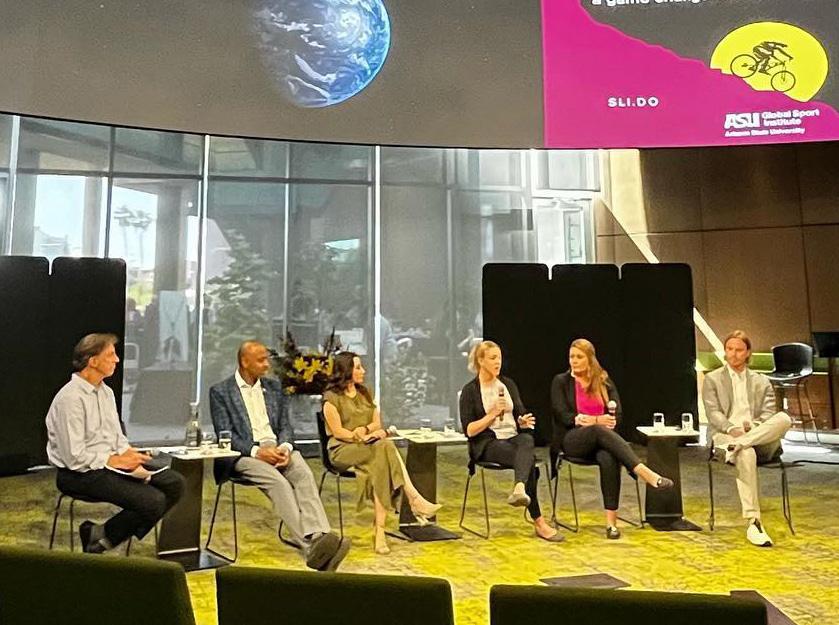
3 minute read
Keeping Pace
KEEPING
“Is Sport the Newest Dark Horse in the Climate Game?” Panel event Left to right: George Basile, PhD (College of Global Futures), Roger McClendon (Green Sports Alliance), Sofi Armenakian (Atlanta Hawks), Jennifer Vanos, PhD (School of Sustainability), Stephanie Gerretsen, PhD (Global Sport Institute), Jordan Enke (Austin FC)
Advertisement
Launched in 2016, the United Nation Sports for Climate Action Framework released updated targets in November 2021 that matched other dire reports of significant impact from climate change in the coming years. The group aims to use sports “as a unifying tool to federate and create solidarity among global citizens for climate action.” As part of its larger mission to use sport to improve the world and to ensure everyone has access to sport, the Global Sport Institute is determined to press forward to support sustainable practices in sport.
During Earth Week the spring of 2022, GSI hosted an event entitled “New Dark Horse in the Climate Game” at Arizona State University’s new Rob and Melani Walton Center for Planetary Health that sought to uncover whether sport could be a driving force in developing sustainable practices in business and throughout communities. Industry leaders from Austin Football Club, the Atlanta Hawks and the Green Sports Alliance joined GSI for the panel alongside GSI Postdoctoral Research Scholar Stephanie Gerretsen, PhD, Global Sport Scholar Jennifer Vanos, PhD, and ASU Global Institute of Sustainability Professor of Practice George Basile.
The group also convened after the event for a podcast conversation, with Green Sports Alliance Executive Director Roger McClendon noting, “If you don’t want to be left behind, you don’t want to become one of those dinosaur companies or businesses, you have to pay attention to what’s happening. ” Sustainability is undoubtedly an integral part of business planning heading into the 2020s, and the sport industry is no exception. As an organization that continually seeks to lead discourse around the intersections of sport and critical global issues, GSI conducted a poll in June 2022 that explored public opinion across several large American cities regarding stadium construction and community impact. The poll found a majority support for tying sustainability standards, clawback provisions and provisions for affordable housing into public funding for stadiums.
Throughout the spring, GSI also published two digital issues connected to sustainability and community development in Global Sport Matters. Gerretsen wrote extensively on urban development in the U.S. and Kenya and the role sport can play in facilitating economic and social growth in cities and communities.
Of course, sport must also face the consequences of environmental change that can already be seen around the world. Those who are historically marginalized will disproportionately be affected. In April, Vanos wrote a Global Sport Matters article based on her GSI-funded research into the effects of heat and pollution on athletes in which she stated, “As we strive for equity in historically disadvantaged populations, we must face a hard truth: Many youth athletes exercise in dirty air and dangerously hot environments because of where they live and go to school, thus inhibiting or even preventing safe participation and future athletic success. ”
It is fundamental to the vision of GSI that everyone can participate in sport, and that sport can be used to improve lives and societies. So not only must sport continue to lead a move toward a future that values the health of the planet and its people, but it is also clear that sport organizations like GSI must seek solutions that prioritize access to exercise, play, and teamwork for all people.
— Jennifer Vanos, PhD, Associate Professor at the ASU School of Sustainability and Global Sport Scholar
At the Intersection of Sport & Sustainability
As a $620 billion industry, sport is uniquely positioned to leverage its platform to bring awareness to climate issues and set standards that safeguard the environment and protect people. We see the intersection of sport and sustainability in efforts like Climate Pledge Arena in Seattle, an NHL and WNBA facility aiming for netzero carbon emissions, and the Union of European Football Associations’ pledge to achieve zero emissions by 2040. As climate change becomes a greater priority worldwide, the Global Sport Institute will continue to bridge research, innovation and learning to help make sport a guiding light toward a more sustainable future.







